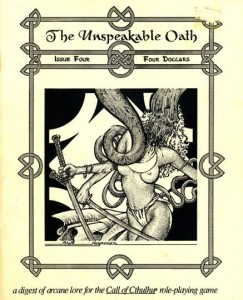©1991 Mark Morrison
Always it comes back to haunt me, this case. Some nights it speaks to me, its leather hasps whispering dire secrets I have no desire to know, no need to learn. I would burn the infernal thing, save that I fear this would somehow signal my own fiery destruction. We are bound together, this case and I, in a bargain I have not seen, and did not sign. Even now it grins at me slyly, daring me to open it again.
My hatred for the luggage from beyond had increased tenfold. Among its crimes of theft and pollution, it has added a sin more heinous. I can barely stand to remember it, yet some strange compulsion forces me to record it here.
It is summer here, bringing a pleasant warmth to my life and work. However, I noted a peculiar smell about my apartments — a rich smell, sour and rank. At first I feared something was amiss in the refrigerator, but I found no evidence of spoiled foodstuffs. Then I was sure that some animal had crawled under the house and died, but a cursory search revealed no such cadaver. Then, as the odor grew more overpowering, I realized that it could only have one source.
Wisely placing a handkerchief over my nose, I approached the case, snapped the clasps, and opened the thing. God forbid! Green and livid pieces of meat, bloated purple organs, grey and leaking lengths of viscera, blackened limbs, and slack dead faces with eyes fixed and staring. It was a box of charnel horror, and I shall never forget the sight.
That’s the thing about guts, gore, splatter and spew: it’s in your face, and you don’t forget it. This can be used to good effect, or fumbled really badly. The central problem with over-the-top descriptions in a Call of Cthulhu game is that there is only one reaction to out-and-out grue: bleah! A fetid and meaty interlude might be horrifying and memorable, but then again it might be ludicrous and laughable. So, use detailed carnage wisely, and judiciously.
Let the mood dictate the viscera. Sometimes unrelenting gross-ness actually helps to distinguish a scenario. No Herbert West-style adventure would work without corpses shedding limbs and spraying fluids with technicolored regularity. But other scenarios require a soft touch, haunting atmosphere, and vague threat. As an example of this contrast, the early scenarios of the Orient Express campaign are about shadows and unsettlement. The later scenarios are pure flyblown frenzy.
The splatterpunk school of horror writing holds that violence is an ugly business, and should be depicted as such. There’s some merit to this. If you need to cure gun-happy or psychotic players, give them a taste of how terrifying combat really is.
As a general rule, violence within the game should be infrequent, but frenzied. Make it confusing, and make it count. Speed up the flow, demand instant responses from the players, launch attacks with terrifying ferocity, wave your arms and shout a lot. The wise know to avoid combat of any kind. Rash investigators are soon rashers of investigators.
The thing about violence is, of course, that people get hurt. Like the investigators. You can bring this home by personalizing the damage sometimes. Scrape knees, sprain ankles, deliver concussion, break arms, knock out teeth, dislocate shoulders, chew off fingers, pop out eyes, bruise ribs. You could say “The claw hits. Take 15 points of damage, and roll under your CON on 1D20,” but who gets horrified by that? Try this: “The hideous clawed arm sweeps past you. You feel a strange numbness. Looking down, you note your left arm is missing from the elbow down. Take 15 points of damage. You know, exposed bone is really, really white. Roll under your CON on 1D20 or pass out.”
That’ll make ’em think twice about hefting their hockey sticks and charging dimensional shamblers. Some injuries also provide dramatic potential. Most of the suspense in the climax of Stephen King’s Christine comes because the poor sap has to drive a concrete mixer/bulldozer with a broken leg. I’ve tried walking on a broken leg myself, and frankly, I’d rather spend the night in the case than do that again.
Which reminds me of a terrible tale yet left untold. What did I do, faced with that casket of human wreckage? I slammed it shut with an inarticulate cry, fled my house, and ran into the night. I lived in the streets for a week. I cannot remember that time, a red madness clouds my memory. It is a miracle that I was not found and incarcerated in some place for the deranged. At last I came to myself, and with singular dread I returned home.
The case lay where I had left it. The smell was gone. There was a strange curve to that closed lid, as if the thing had a satisfied smile. With a moan of horror, I sprang at it, and flung the damned thing open, to dispel my madness, or to confirm the sight I had but recently witnessed. The meat was gone. No faces stared up at me. No bloated organs. But the bottom of the case was littered with bones, and each had been expertly cracked for the succulent marrow within.

